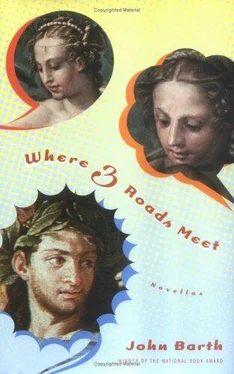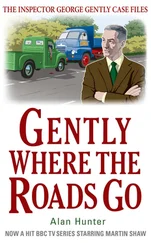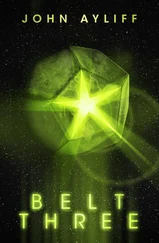Much shaken and saddened, though less than griefstricken, by the loss of their parents, and feeling as much at home in the college town where they'd lived since birth as they'd felt in the house itself, they went on with their not-unhappy lives. Marsha's senior-year high school boyfriend, who'd done his first two college years in upstate New York, transferred to his hometown campus to complete his degree in Electrical Engineering as she completed hers in Education, and eventually moved in with his reignited old flame. Like Mike Blank and Maddy Norman (and Billy Marshall and Elsa Bauer), the couple married not long after their commencement and found employment in the area. Philip — who shortly after graduation re-changed his last name from Norman back to Blank and took a job in the university's public information office — reverted as well from an ambiguous bisexuality to less and less sexuality of any sort: To their mutual old acquaintances, "Nor-man nor woman," Billy Marshall joked, "equals Blank."
And blank his life might be said to have been, by many people's standards and sometimes his own, over the century's ensuing decades: a competent if undistinguished career in various of the university's administrative offices; one more sort-of-relationship, with a female office-neighbor several years his senior, whose rebound from an acrimonious divorce presently impelled her far from the region where her ex-husband chose to remain, and ended the affair — Phil's final experience of other-than-solitary sex, and on the whole an enjoyable one, for him at least. Occasionally he lunched with old acquaintances or administrative colleagues; most Sundays he dined with his sister and brother-in-law and their three children, whose uncle he was pleased to be despite his natural aloofness. Sometimes with them, more often alone, he attended varsity athletic events and university-sponsored concerts or theater productions. For exercise he walked the campus or the town's so-familiar neighborhoods; in the long Allegheny winters he sometimes worked out in the college gym. Most evenings he was content to dine alone in his apartment (later, his condominium in a new development north of town), read news-magazine articles for an hour or so, and then watch television or some video recommended by Marsha. If asked, he would not have characterized his life as unhappy, while acknowledging it to be far from full; but no one asked, and he himself, from his thirties on, gave ever less thought to such questions. His sister took vacation trips with her family, as did Billy and Elsa Marshall — to Florida, Maine, California, Hawaii, Europe. Philip's job sometimes took him to the university's branch campuses in sundry Pennsylvania counties and, less often, to meetings and conferences in Cleveland or Indianapolis, Ann Arbor or East Lansing; his vacations, however, he preferred to spend at home.
"Doing what? " Marsha's husband asked her once. His wife rolled her eyes, shook her head: "The Sunday Times crossword puzzle, maybe? Filling in the blanks, as Billy Marshall used to say."
In his late fifties, to Marsha's surprise and somewhat to his own, Philip elected to take early retirement. With his university pension, the dividends from sundry annuities, and his considerable savings, he would scarcely notice the reduction in his annual income. "Lucky fellow!" most of his child-raising, tuition-paying acquaintances agreed. "But what are you going to do with yourself?" his sister made bold to ask him.
A quarter-century earlier, Philip might have responded, "Do with whom?" But over the decades he had lost interest in that question. "Whatever I damn please, I suppose," was his mild reply.
For an academic year or two thereafter (time's main measure in small towns with large universities, even among the non-academic), he experimented, dutifully if less than enthusiastically, with various activities recommended for new retirees by the appropriate campus office: joined an alumni tour group for a week's visit to London; tried to interest himself in such hobbies (he'd never had a hobby) as contract bridge and Elderhosteling; volunteered briefly (the retirement-office people were big on volunteering) in a Head Start program designed to help black inner-city youngsters overcome their academic disadvantages, but directed locally, faute de pis, at their poor white Appalachian counterparts. But London overwhelmed and the game of bridge intimidated him; "at his age" he took no pleasure in learning complicated things from scratch and going places with groups of strangers. And while he pitied the young hillbilly left-behinds, he had no knack for motivating them to attempt what they themselves evinced little interest in. By the end of his first retirement year he looked forward to none of those activities. Midway through his second he dropped them all and settled into a routine of reading front to back the Centre Daily and New York Times through breakfast and beyond, then going for an extended walk if weather permitted or pottering about the condo if it didn't; perhaps lunching in town (sometimes with ex-colleagues), doing afternoon errands, or strolling the vast campus a bit. At five, back at the condo, he took a glass of red wine on his small screened porch or before the gas fireplace, then sipped another while preparing and eating his simple dinner. And finally — unless there was some interesting public lecture or other university event on the calendar — he settled down among his parents' furniture in his tidy living room to entertain himself with magazine or library book, television or desktop computer.
Was he bored? Of course he was, now and then, though not acutely. Anyhow, he was accustomed to the feeling and didn't much mind it; wasn't overly bored by boredom. Depressed? He had his ups and downs, neither of much amplitude; was and had prevailingly been of placid, equable disposition. Lonesome? Not especially, nor reclusive either, just solitary. On any stroll or shopping errand, he would likely exchange cordialities with one or more familiars; if he had no real friends, he had old acquaintances aplenty, some dating back to kindergarten. Happy? Not particularly, but (as afore-established) not unhappy either: more or less content.
And so we find him — one fine mid-May afternoon shortly after the university's spring commencement, when the wholesale exodus of tens of thousands of students leaves the town and campus spookily evacuated until various summer programs kick in — driving his high-mileage chalk-white Toyota Corolla out toward a nearby shopping plaza after lunch, with the aim of picking up a few groceries and maybe a DVD to spectate over the next two evenings, there being nothing listed in the TV Guide of much interest to him. Who can say why, upon reaching the plaza, he canceled his turn signal and drove on past the entrance? Perhaps with the object of replenishing his wine rack first, at the state liquor dispensary a bit farther on? Reaching it, he slowed and resignaled, but once again didn't stop; found himself continuing north another dozen miles through assorted hill and valley villages until the state two-laner T-boned into Interstate 80, which from that point crosses central Pennsylvania, east to New York City and west to Ohio and beyond. On some impulse beyond his articulating, he turned west, set the Corolla's cruise control to (as it happened) approximately the speed matching his age, and, under a fair-weather cumulus-clouded sky, steered through Allegheny hills green with young deciduous leaves, old hemlocks, and newly sprouting farm fields, without wondering (as if on cruise control himself) where he was going or why, or for that matter who it was, exactly, at the wheel.
Not having planned an extended drive, he hadn't topped off the car's fuel tank. Already by exit 22 (Snow Shoe), just a couple of dozen miles along the interstate, its gauge showed barely enough gas remaining to get him back home. He registered that datum, but drove on. He had with him no water bottle or other refreshment, and felt some thirst, but drove on. Not far from where I-80 crosses the winding headwaters of the Susquehanna's West Branch — which loops north and east from there up to Williamsport before commencing its long run south past Harrisburg and down to Chesapeake Bay — in a forested stretch between exits for Clearfield and Du Bois, the Corolla's four-cylinder engine sputtered dry. Fortunately, there was scant traffic just then on that stretch of highway; moreover, he happened to be on a downgrade, with enough momentum to give him ample time to steer out of the traffic lanes without obliging others to slow down or swing out to pass. His foot still uselessly on the accelerator of the stalled engine, he coasted down the wide shoulder until the slope bottomed out and the Corolla rolled to a stop without his having pressed the brake pedal. So as not to endanger vehicles approaching from behind, he activated the hazard flasher, but didn't bother to shift to Park or switch off the ignition. From the roadside woods a lean brown rabbit ran onto the highway shoulder just before him. It paused, sat up on its hind legs, regarded the unmoving vehicle, and scuttled back.
Читать дальше












